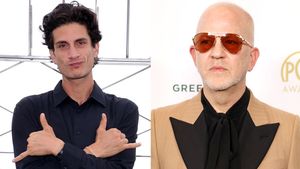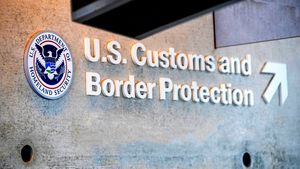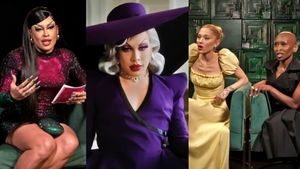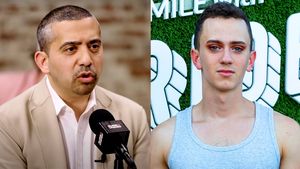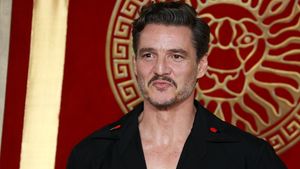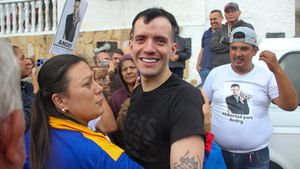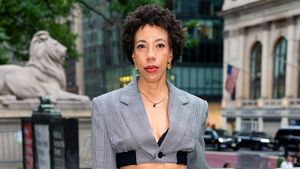Secretary of State Hillary Clinton reveled before a standing-room-only crowd of more than 500 State Department employees celebrating gay pride at the agency's Loy Henderson Auditorium in Washington, D.C. last summer. "Gee, let's do this every week!" she said. This, it seemed, was to be more of a reunion of old acquaintances than a perfunctory speech on diversity.
At first, Clinton glanced down--to the lectern and her prepared remarks. But her focus on the written page melted away as she looked up and rolled on with the speech, channeling the myriad mental notes she had made over the years.
Displaying an uncanny depth of understanding for the challenges that many LGBT youth experience, Clinton spoke of tragedies that would only come to national attention months later after a spate of heart-wrenching teen suicides dominated headlines for weeks. She called on the staff members before her to help create a safe space for gays and lesbians everywhere, "Particularly young people, particularly teenagers who still, today, have such a difficult time and who, still, in numbers far beyond what should ever happen, take their own lives rather than live that life."
Men and women around the world were being "harassed, beaten, subjected to sexual violence, even killed, because of who they are and whom they love," she said.
"This is a human rights issue," Clinton told the rapt audience. She ad-libbed, recalling an oft-quoted line from a landmark speech on women's rights at a U.N. conference in China: "Just as I was very proud to say the obvious more than 15 years ago in Beijing--that human rights are women's rights, and women's rights are human rights--well, let me say today that human rights are gay rights, and gay rights are human rights, once and for all."
Asked months later what was going through her mind when she offered the unscripted line at the pride celebration, Clinton responds with her inimitable laugh. "Oh, heavens, I don't know--I don't know," she says before settling back into the moment. "I was looking out at the audience where a lot of longtime friends, political supporters, colleagues were sitting, and it just seemed so important and right to make that statement."
Hillary Rodham Clinton was in the midst of running damage control on one of the most revealing and frenetic episodes in State Department history when I interviewed her by telephone in early December. Two weeks earlier I'd still been planning for a sit-down meeting to discuss her work on LGBT rights at the State Department when I received an ominous preemptive e-mail from the White House press office.
"We anticipate the release of what are claimed to be several hundred thousand classified State Department cables on Sunday night that detail private diplomatic discussions with foreign governments," the statement began, foretelling a tidal wave of international correspondence that would become equal parts historical treasure trove and diplomatic nightmare. From that moment on, my place on the secretary's calendar was tenuous at best. Finally, Clinton's schedulers managed to work in a call two days before this magazine went to press.
Feeling your way through an interview with one of the world's most powerful women is more art than science. Marriage seemed like the place to start, since Clinton had been caught off guard by a recent inquiry on the issue while visiting Australia. Her husband has said that he now supports full marriage equality: Many of his gay friends are in committed relationships, former president Bill Clinton said in 2009. As far as marriage goes, he said, he had just been "hung up about the word."
Did she share his experience? I wondered.
Was she at odds with President Barack Obama's stated position in support of civil unions but against marriage equality?But on the phone, Clinton is circumspect about her husband's comments. "Well, I share his experience because we obviously share a lot of the same friends, but I have not changed my position," she says without elaborating. The secretary wasn't taking any political bait, nor was she going to tangle with anything that could figure negatively for her boss.
Clinton's chief of staff and counselor, Cheryl Mills, had modeled the same on-message discipline when I sat down with her a few weeks earlier, avoiding any comparison between the secretary's movement on LGBT issues and the president's. Mills and Clinton have been friends for nearly 20 years, dating back to when Mills served as deputy White House counsel for President Clinton. She arrived on the national stage as part of a legal team defending the president during the 1999 impeachment trial. A quick Google search of Mills's name turns up the crux of her argument, spoken on the Senate floor from the perspective of an African-American woman: "I'm not worried about civil rights, because this president's record on civil rights, on women's rights, on all of our rights, is unimpeachable.... I stand here before you today because President Bill Clinton believed I could stand here for him."
Anyone who's worked in a high-level government position knows the hours are grueling, the pay is paltry, and the demands are endless. But when Hillary Clinton asked her friend Mills to leave her position as a senior vice president at New York University, Mills acquiesced. Despite her intellectual heft and considerable accomplishments, Mills is surprisingly down-to-earth. When I first meet her in the maze of State Department hallways and address her by title, she is quick to say I should just call her "Cheryl."
Mills is striking and quick-witted but doesn't seem enamored of either Washington protocol or hierarchy. She's not here for prestige--she's here to champion the cause of Clinton, who she believes is a model public servant. "If you are a student of who she has been, even from her beginning days coming out of law school, [you know that Clinton] starts from a frame of, 'What maximizes each person's opportunity to live up to their God-given potential?' " Mills says.
That sentiment has served as the foundation for Clinton's work at the State Department. And the bond between Clinton and Mills--their laser-like focus, their common passion for advancing the cause of justice--has yielded what is arguably the Obama administration's most progressive and productive agency on LGBT equality, one that has overhauled discriminatory personnel policies while championing gay rights internationally.
Optimizing conditions for LGBT employees and their families was a crucial step forward. Of the nearly 2 million federal workers in the United States, the State Department's gay employees have perhaps the most at stake when it comes to domestic-partner benefits. Not only does working abroad make for a demanding career, but relocating one's partner and family also creates added stress for the department's roughly 13,000 Foreign Service members. The spouses of heterosexual employees based overseas have long been considered when it comes to expense allowances, housing, emergency evacuations, passport and employment assistance, and other benefits. But prior to Clinton's tenure, same-sex partners received none of these benefits. As Mills notes, "There were a number of things here that looked very obvious as inhibiting the opportunity to get the very best out of people."
A member of the agency's LGBT employee group, Gays and Lesbians in Foreign Affairs Agencies, raised the issue of inequity during Secretary Clinton's first employee town hall meeting in February 2009. Clinton responded that she had already asked her team for a review of the policies. "It's on a fast time line," she said. Patrick Kennedy, the undersecretary for management and a 38-year veteran of the State Department, remembers the charge Clinton gave him: "Her instructions to me and to Jim Thessin, the deputy legal adviser, were, 'Let us do everything that I in my powers can do to resolve this.' "
While federal employees with a same-sex partner are excluded from many benefits conferred upon their straight counterparts--a result of the 1996 Defense of Marriage Act--the Foreign Service Act gives secretaries of State broad authority over passports, housing, shipping, transportation, and access to health facilities necessitated by living abroad. Kennedy, who also happens to be the senior officer assigned as the department's leadership liaison to GLIFAA, performed a bureaucratic Houdini act to change the policy in a matter of months, managing to identify the fixes, push the paperwork through four separate bureaus, and vet it with the department's lawyers. Thessin, Kennedy adds, "brought to the table as many of his lawyers as we needed in order to work this through."
"That was very impressive, absolutely," says Jon Tollefson, president of GLIFAA. "Given the way that everything else functions in a bureaucracy, this was full throttle."
By May 2009 the department was ready to move on the changes--one month before President Obama signed an executive order conferring on all government workers a limited set of benefits not prohibited by DOMA, including sick leave to take care of a domestic partner. Obama further instructed each federal agency to review which internal policies could be made more equitable.
The State Department also aggressively revised passport regulations for
transgender citizens, who were previously required to provide proof of sex-reassignment surgery in order to change their gender marker. Now trans people only need to provide certification that they are under a physician's care for gender transition. At the time the new policy was announced last June, Mara Keisling, executive director of the National Center for Transgender Equality, marveled at the expeditious change. "It came faster than I thought," she said.
The change was particularly important for transgender individuals who live in states with antiquated driver's license and identification rules; now they can travel both domestically and abroad with government-issued ID that accurately reflects their gender identity. It's one of the most important advancements for transgender civil rights ever made at the federal level.
Brenda Sprague, deputy assistant secretary for passport services, says the issue had apparently been identified years earlier by a State Department bureau but suddenly became a priority when Clinton took office. "If you saw my in-box," she says, "you would know that there's 100 good ideas and initiatives in it, and sometimes it is encouragement from higher up that enables it to move from the bottom of the in-box to the top."
When Mark Bromley of the Council for Global Equality met with the State Department's assistant secretary for human rights under President Bush in 2008, he says he tried to persuade the administration to take a stand against laws abroad that criminalize homosexuality. "I was basically told, 'It's difficult for us to speak out against a law that is legally and democratically enacted in another nation,' " Bromley says. "It was a polite, diplomatic way to say, 'This is not part of our agenda.' "
That's the fundamental dilemma of every diplomacy dance between countries: When does a nation's action interfere with another nation's self-interest? The answer largely depends on how one views the core values that define one's "self-interest"--and it looks quite different as seen through the eyes of Cheryl Mills.
"It's a delicate balance," Mills acknowledges, "because we recognize that we are culturally different--each country and each culture gets to determine who they are. But when they are making determinations that go to fundamental human rights, that's a place that we have to draw a line."
By the time a Uganda bill surfaced in the fall of 2009 that would make homosexuality--already illegal in the nation--punishable by death or life in prison, the Obama administration had already joined more than 60 other nations in supporting the U.N. General Assembly's statement on human rights, sexual orientation, and gender identity. Nonetheless, the "kill the gays" bill put the State Department's diplomacy surrounding LGBT rights to the test.
Johnnie Carson, the assistant secretary of state for the Bureau of African Affairs and a former U.S. ambassador to several African countries, says Mills showed immediate interest in the bill, asking him what the U.S. embassy in Uganda was doing in response. "She also asked me to take advantage of any meetings with high-level officials to raise this matter," says Carson, who was scheduled to visit Uganda on a couple occasions to consult with President Yoweri Museveni on issues surrounding his country's involvement with peacekeeping forces in Somalia.
As those conversations concluded, Carson used the opportunity to urge Museveni to stymie the antigay bill being advanced by parliament member David Bahati. "I told him that we felt it was a violation of human rights and that this kind of legislation would have a negative impact on Uganda's image," he recalls.
Carson implored Museveni several more times, both in person and by phone, as did Secretary Clinton herself. By design, these discussions were done outside the media spotlight: The State Department didn't want to inflame an already bad situation and further endanger Uganda's gays and lesbians. "It was not until there was a greater public debate in the Uganda newspapers and we were questioned more directly here in Washington by gay and lesbian groups that we felt that it was appropriate to respond more openly outside of diplomatic channels about what we had done," Carson says. By that time, Museveni had already acknowledged to the media that he'd had discussions about the bill with U.S. diplomats--a key step, Carson notes, to avoid shaming and potentially damaging relations with a foreign government at a critical time.
"We do not need to do something publicly when we can achieve the same goals and objectives privately," Carson says.
For Secretary Clinton, operating in the shadows while enabling LGBT groups on the ground to exert their influence was really the best option. "Sometimes, what we might consider an appropriate political or social action on behalf of people who are under threat would not be helpful in certain cultures," she says.
Bromley calls the State Department's level of engagement on the Uganda bill "remarkable for any human rights issue, not just an LGBT issue." Indeed, it's serving as a model for U.S. diplomats in Africa, where anti-LGBT sentiment has led to violence and unjust imprisonment in countries such as Cameroon, Malawi, Zimbabwe, and Kenya.
"There is this rising global tide of violence against the LGBT community around the world," Clinton says, "and we are taking the lead in confronting the dangers of the lives and the livelihood of LGBT people as they go about their daily lives."
As she works to redefine the U.S. role on international gay and lesbian rights, part of Clinton's job has been to make sure a cultural shift permeates all levels of the State Department and the furthest reaches of its bureaucracies, including U.S. embassies, where change can sometimes come at a slow pace.
As part of that effort, Clinton sent a diplomatic cable shortly after her pride speech to all U.S. embassies clarifying the department's LGBT human rights policy. The agency created a fund to support gay rights activists around the globe who may be in danger and in need of resources to relocate. "We've tried to put LGBT issues near the top of the administration's foreign policy agenda and made that clear to our ambassadors and other personnel around the world," Clinton says, "particularly in places where violence is permitted by the law, where it is inflamed by public calls, and in places where it just persists as a stumbling block to people realizing their own aspirations."
No one has ever questioned Hillary Clinton's wit, her policy credentials, or her ability to outmaneuver the most agile of Beltway operators in order to achieve her goals. But rarely does one read about her personal touch, the fierce loyalty she inspires in the people who work for her--emanating from her inner circle of advisers all the way to the outer reaches of the State Department walls.
"It's just evident--this secretary cares about people," says undersecretary Kennedy. "She wants to make sure that we hire the best people, give them the best training, do what we can to retain them, do what we can to deploy them in ways that advance the national interests."
Mira Patel had only worked in the office of then-senator Clinton for about six months when Obama appointed Clinton as secretary of State. "I was still feeling my way around in what I thought was the greatest job I had ever gotten," says Patel, who was 25 at the time and serving as Clinton's legislative correspondent for foreign affairs and finance. She had started as an intern, tasked with meeting Clinton at her car each morning when she arrived at the Senate to help carry her briefing book-laden bags upstairs. "She knew my name after the first week of picking up her bags--knew I had gone to Wellesley [College], where she had gone," Patel says.
As the senator prepared to transition into her new role, Clinton called Patel into her office. "She had her glasses on, and a cup of tea, and a whole stack of policy papers," Patel says. "She said, 'Mira, sit down, I want to talk to you. As you know, I'm going to the State Department, and I would like you to come with me.' "
At that moment, the senator's future chief of staff walked into the room. "Before I could react, Hillary said, 'Oh, and I'd like you to meet my friend Cheryl--why don't you tell her a little about yourself?' " says Patel, who eagerly informed Mills of her background and areas of interest. "I was thrilled. I just remember saying it would be an honor to do anything for the senator. If she had said, 'I'd like you to wash the windows in my car,' I would have happily done it."
Patel ended up on the secretary's policy planning staff with women's and refugees' issues in her portfolio. "As I was here, I realized there was an acute need to cover LGBT issues," she says with the classic enthusiasm of a young Washington overachiever.
With Clinton's blessing and Mills's open-door policy, junior staffers such as Patel--as well as GLIFAA members on up to deputy assistant secretary Dan Baer, the highest-ranking openly gay official domestically based at the department--have been able to effect change in the U.S.'s approach to LGBT issues, one that's visible from Serbia to New Zealand to Uganda. "Having a very visible commitment from the top makes everything that I do on this issue easier," Baer says.
As part of the policy planning staff, Patel is stationed in the office that vets every memo bound for Clinton's desk--meaning she can flag any gay-related matter and weigh in if necessary. When LGBT issues were added to Patel's portfolio in the fall of 2009, she authored her own memo on gay human rights strategy that helped facilitate a dialogue on the subject between top State Department officials--people like Anne-Marie Slaughter, director of the policy planning staff, and Mills, who emerged as a central figure in almost every conversation I had.
"Cheryl has really been the point person who has helped to lead these efforts along with the senior leadership at State," Clinton says. If the e-mails start flying at 5:30 a.m. about some antigay atrocity overseas, Mills is on the list, along with the corresponding bureau, Baer says. If Patel and GLIFAA's Tollefson have a concern, they're never more than an e-mail away from getting on the chief of staff's calendar.
Sitting with Mills in the State Department, I can't help but compare her to another recent chief of staff in the Obama administration: Rahm Emanuel. Both served in the Clinton administration, and while Emanuel seems to have emerged gun-shy on LGBT issues, Mills frankly is just the opposite. Although she avoids saying much of anything on the record that is overtly personal, she does offer me a window into why the battle for LGBT equality stirs her.
"My life has been created based on the other people who have fought for the privileges that I have--the privileges that I have to be a lawyer, to have gone to the institutions that I've gone to, even just to get educated as an African-American," Mills explains. "So when I look at some of the limitations that others experience, I'm conscious of the fact that other people chose, for me, to put their lives and their privileges on the line, and I have an obligation to step up as well."
And as Mills sees it, the State Department under Secretary Clinton has been perfectly positioned to change and even mainstream the global dialogue on LGBT rights: "One of the opportunities of being Secretary Clinton, and certainly one of the opportunities of being at the State Department, is you are representing America's highest self, if you will, in terms of how it engages the world. At least, that's what we seek to do."
But as close as she and Clinton are, Mills says she had no idea the secretary was going to couple human rights and gay rights during her speech at last summer's State Department pride celebration--a speech that might well go down in history as a turning point for LGBT rights around the globe. "This struck me as part of the continuum and consistency of where [Clinton] starts from and how she looks at the world. So I was glad that she did say it," Mills says. "But it's also something that she lives every day."
Not everything where LGBT rights are concerned has gone perfectly at the State Department under Hillary Clinton. A U.N. vote last November removed "sexual orientation" from a resolution condemning executions on a variety of discriminatory grounds. Advocates said administration officials should have seen the vote coming and disrupted the group of African countries that banded together to push it through. But the setback was quickly erased by a successful December vote that reversed the ruling.
HIV/AIDS activists have railed against the administration's PEPFAR funding levels, which in 2010 fell far short of Obama's promises during the campaign to provide at least $50 billion by 2013--which would have necessitated an increase of about $1 billion each year. But a new plan of providing $63 billion over six years for a broader global health initiative in which 70% of the funding is dedicated to HIV/AIDS now appears to have set the administration on course to reach Obama's campaign pledge by 2014, albeit a year late.
And an internal effort to designate a specific person as an LGBT policy adviser failed based on disagreements about such a position's overall efficacy.
But here's what has become objectively clear: It's not necessary to have such an adviser when people like Clinton and Mills are thoroughly conversant on the issue-- constantly leaning into it rather than away and empowering those below them to help change the culture.
I made one interview request to the secretary's office, and after a short vetting process, it was granted. Clinton's communications staff also set up more than a handful of interviews with high-ranking officials and gay people serving in the department in order to illuminate their internal policy making regarding LGBT rights.
Clinton also kept a commitment to discuss her department's LGBT advances at a time when most people in her position might have understandably tabled the interview. "I just really have a strong negative reaction to prejudice, discrimination, hatred, violence--anything that tries to delegitimize or marginalize any of our fellow human beings," she says. "So it fits into my long-term and personally felt commitment to expanding the circle of human rights for everyone."
On the next page, see Secretary Clinton in action.


